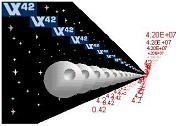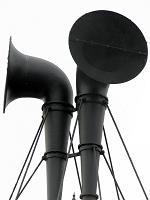![]()

Nunc lento sonitu dicunt, morieris. (Now this bell tolling softly for another, says to me, Thou must die.)
John Donne Devotions Upon Emergent Occasions, Meditation XVII
No man is an island, entire of itself; every man is a piece of the continent, a part of the main. If a clod be washed away by the sea, Europe is the less, as well as if a promontory were, as well as if a manor of thy friend's or of thine own were. Any man's death diminishes me, because I am involved in mankind; and therefore never send to know for whom the bell tolls; it tolls for thee." (John Donne, Meditation XVII, from Devotions Upon Emergent Occasions, 1624)
Three hundred years lie between Donne's No man is an island and
Einstein's remark that a human being is part of a whole (discussed below), and each involves a contemplation of death as a type of illusion.
Early in his life, Albert Einstein became aware of the illusions begotten by common sense. As a boy, he imagined himself riding a light beam and speculated on how things would appear as he approached the speed of light. Understanding the new shapes they would assume, he concluded that the universe is a strange place indeed, providing little to verify common explanations of it. He grew up to demonstrate this strangeness to the entire world. which proclaimed him a genius for theories it could not understand. Einstein set aside common sense to usher in a perspective that, to the cab driver and the politician, offered nothing but nuclear bombs. To poets, he brought forth Yeats' question, What rough beast, its hour come round at last, slouches toward Bethlehem to be born? To Einstein himself, nothing comforted in the world he had opened for physicists such as
Neils Bohr, who told him that all was random, mere chance. No, Einstein replied to Bohr, God does not play dice with the universe. This, he could not accept even to his death bed.
He eventually allowed Bohr's Complementarity Principle as the most rational explanation for quantum events, which is to say the wave-particle duality, persisting to this day as the central puzzle of quantum physics. (Richard Feynman said that if you aren't troubled by it, you don't understand it.) He also came to accept that he wasn't who he thought he was. Nobody is. We are all something other than what we think we are. We are, so to say, not our selves.
Wave-particle duality indicated the failure of a classically materialist explanation of the universe. Later, with experiments such as John Bell's and Alain Aspect's,* the nature of things appeared as non-local, a remarkably weird feature of the universe, but which photons fired 40 meters apart consistently suggested. Matter itself seemed not specific to a point, but instead participated in a different kind of space, one inhabited by a consciousness belonging to nobody in particular and everything in general. * (See them in
Non-Local Reality, 10 November 2003.)
Einstein had thought about consciousness when faced with Bohr's Complementarity and, after deliberating on it, he again concluded with an idea that the cab driver and politician would take as bizarre.
If the universe cannot be described by material points in space, by discreteness, said Einstein, then, as a collection of matter, the separate human self is an illusion:
"A human being is a part of the whole, called by us the 'universe,' a part limited in time and space. He experiences himself, his thoughts and feelings as something separate from the rest--a kind of optical illusion of his consciousness. This delusion is a kind of prison for us, restricting us to our personal desires and to affection for a few persons nearest to us. Our task must be to free ourselves from the prison by widening our circle of compassion to embrace all creatures and the whole of nature in its beauty. Nobody is able to achieve this completely, but the striving for such achievement is in itself a part of the liberation and foundation for inner security."
By this remark Einstein stepped out of classically scientific considerations into the spiritual life which, in a sense, had formed his basic temperament. It had helped spur Einstein as a boy when he imagined himself traveling on a beam of light, for his universe was one with a grand design that allowed human understanding or mystery wherever mind probed. Nor was he far from poetry in his regard for beauty. "Death is the mother of beauty," said poet
Wallace Stevens. In its contemplation we see our limits as individuals, as he did.
Death is the final liberator, and from its freedom none do escape. It is the mother of compassion, and as Wallace Stevens said in another context, "Hence, from it all things must follow." The liberation itself lies in Einstein's words if we can but fathom their profound implication. There's nobody at home. Nobody is telling the story. The story tells itself, with the story teller woven into the plot.
People find this unacceptable. Death, they say, is the obverse of life, and spurs us into creative energy. We want to leave something behind, to make a mark, something that lasts, so to establish ego beyond the grave. We would not die without having lived, our lives understood as a self making coherence of the world.
Einstein may not have fully grasped his own meanings, but at bottom his implications are that ego cannot die because it was never born. As he puts the situation, ego is an optical illusion of consciousness. People would gladly accept non-death if they could but understand it, deeply, fully, after they have died unto their egos. What died was fiction.
This is not so much theory, and is available to science, a different kind, one that silently examines consciousness. Its practitioners have been many, and one was
Sri Ramana Maharshi, who wrote to Mercedes De Acosta in response to her book, Here Lies The Heart. Without ego, the world is. Of the egoless state, he said, "The Gnani (the Enlightened) continually enjoys uninterrupted, transcendental experience, keeping his inner attention always on the Source, in spite of the apparent existence of the ego, which the ignorant imagine to be real. This apparent ego is harmless; it is like the skeleton of a burnt rope--though it has form, it is of no use to tie anything with." (See
Mercedes de Acosta and Ramana Maharshi, 24 January 2004 at the Occasionals site.)
Ramana Maharshi also said, " Your glory lies where you cease to exist." This is not a uniquely Hindu vantage, and can be found in Christianity. St Gregory said, " No one gets so much of God as the man who is completely dead." A Medieval German, Meister Eckhart advised, " The Kingdom of God is for none but the thoroughly dead" and William Blake told us that " We are in a world of generation and death, and this world we must cast off." Each of them had arrived at the same understanding although their paths were different.
"We are such things as dreams are made on," said Shakespeare's Prospero, "and our little lives are rounded with a sleep." Of that sleep, John Donne's contemporary, Sir Thomas Browne, remarked, " Our longest sun sets at right descensions, and makes but winter arches, and therefore it cannot be long before we lie down in darkness, and have our light in ashes." * He urges us to make much of time.
Zen Buddhism teaches that form is emptiness, emptiness, form, and all participates in the continual change that is life and death. Ego vanishes and reappears, as do thoughts and lives. Shadows lengthen inside Buddhist zendos when disciples chant the Evening Gatha:
Life and death are of supreme importance.
Time swiftly passes and opportunity is lost.
Each of us should strive to awaken.
Awaken!
Take heed . . . Do not squander your life.
Their voices trail off with the last syllable, carrying it into the silence, from which new sounds will emerge. A baby cries, spanked into life in the delivery room while in another part of the hospital an old woman's eyes shut for the last time. Albert Einstein, John Donne, all of them appeared and vanished, just as you will leave this page and these words will fall from your mind, our brief contact over.
* Hydriotaphia, or Urn Burial, 1658









 Carlie Brucia has been on my thoughts lately. Abducted, then raped and murdered, she died as nobody should, especially not an eleven year old. The video surveillance camera shows her being quietly led off, her hand in the man's, as if adult authority is not to be challenged. This is a powerful, disturbing, scene, and one that reaches into human nature itself.
Carlie Brucia has been on my thoughts lately. Abducted, then raped and murdered, she died as nobody should, especially not an eleven year old. The video surveillance camera shows her being quietly led off, her hand in the man's, as if adult authority is not to be challenged. This is a powerful, disturbing, scene, and one that reaches into human nature itself. 

